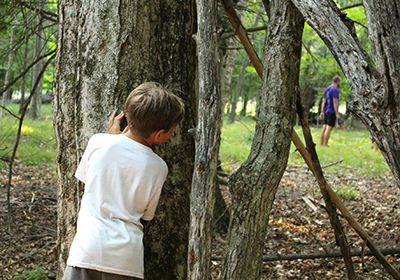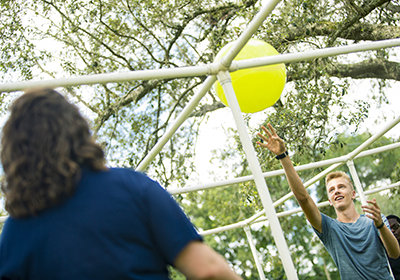

Going to summer camp is more than a week of fun for kids and an opportunity to earn a little money for their counselors. It’s also a chance to experience independence, learn leadership and social skills and prepare for a future career, according to Jim Sibthorp, PhD, a professor in the Department of Parks, Recreation, and Tourism
Sibthorp is part of a University of Utah research team doing two longitudinal studies in partnership with the American Camp Association that look at the lasting impacts of camp on child campers and young staffers. The project, which has been ongoing for a few years, also is supported in part by The Spencer Foundation.
“Most of our research centers on how youth and families access, use, and view summer camps. We also have a lot of information on camp staff – what they learn, how they struggle, and how camp employment fits into their own growth and careers,” said Sibthorp, who also runs a lab on outdoor education and youth development.
Learning Leadership
The longitudinal studies already have produced a wealth of information about the camp impact on staffers and campers.
The camp counselors are “emerging adults” who were about 19 years old when the study began. Now 20- to 21-year-olds, they are being tracked for five years, with information being collected through interviews and surveys twice a year about their experiences.
The 250 staff members come from about 50 accredited camps across the county. These camps are a range of types, with the main one having an intense, cyclical nature during a 9- to 12-week period of summer employment. A new group of campers arrives each week and the counselors deal with conflicts, learn how to communicate with the kids and see the reactions when they change how they do something.
Then the week ends and the cycle starts over with another group.
The job provides an authentic leadership experience that these young adults won’t get working at a fast-food restaurant or in retail sales, Sibthorp said.
“You also don’t get the kind of intense social system that has very immediate feedback,” he said.
By working at the camps, the emerging adults think about their social skills, what type of people they want to work with and what types of jobs they want, according to Sibthorp. He said they figure out if they want to work in a collaborative or an individual work space or if they want to work with their hands versus at a computer.
“They’re finding a career that fits with their own dispositions and their own kind of identity,” Sibthorp said.

Skills that Last a Lifetime
The youth impact study, which is designed to identify the most promising learning outcomes from camp that are useful in daily life, began with more than 450 parent-child dyads. The children were about 9 years old at the beginning of the study and now are approximately 11, most of them in the sixth grade.
Some parents with younger children use day camps for childcare, while others send their kids to skill-based camps to follow an interest such as soccer, coding or drama. Some children go to overnight camp to experience independence and learn relationship and social skills.
Another motivation is to give kids an “electronics vacation” with no video games or cellphones allowed. Most camps are cellphone-free anyway, providing the opportunity to experience JOMO, or the Joy of Missing Out, Sibthorp said.
“There’s a lot of value to just enjoying the moment,” he said.
Elements such as laughter and community also are important, he said
“If we lose those things, we just have a weeklong school and people don’t want that,” Sibthorp said. “Most students need a different experience in the summer to complement what they’re getting in the school year.”
Adjusting Camp to COVID-19
The research expanded recently to include two smaller projects. The camp experience changed dramatically as the coronavirus pandemic spread, and parents will be interviewed in the fall about how COVID-19 affected what they did during the summer.
In addition, the U. team has been monitoring 20 camps to see how they manage COVID-19 over the summer, whether they close for the summer, partially open, or open with operational changes.
Adjustments by some overnight camps include reducing the number of bunks in cabins; forming pods with kids participating in activities in smaller groups; and having staff members serve meals to campers rather than offering a buffet, according to Sibthorp.
“What we’re finding is the prevalence of COVID-related incidents are relatively small,” he said.
Changes closer to home include small groups of parents hiring someone to run a neighborhood camp for their children, Sibthorp said.
Sibthorp thinks there will be a decrease in the number of camps because of closures and consolidations but that the demand for the camp experience could increase next summer as people develop a deeper appreciation for its health benefits.
"Parents have struggled to keep their kids engaged, active, and off their phones. Children and youth, naturally seeking a degree of separation from their families, have had fewer opportunities to cultivate their interests, socially connect, and step-up as leaders under the helpful structure and guidance provided by summer camp," says Sibthorp. "COVID-19 has been a stark reminder of the value of summer camps for many families."